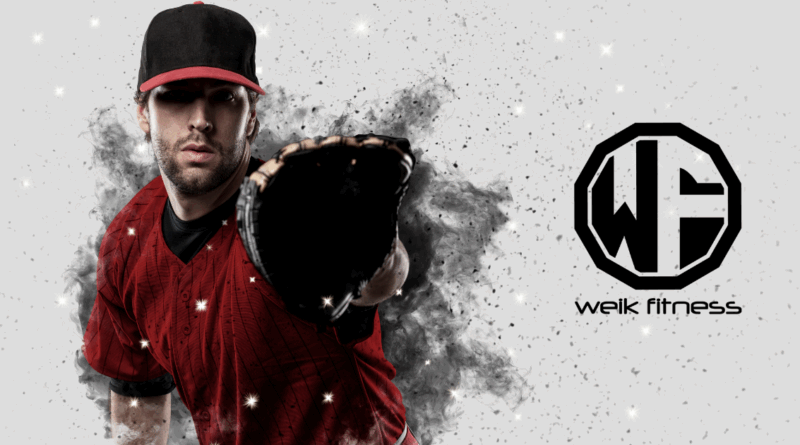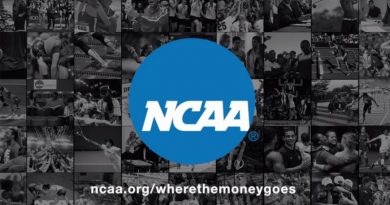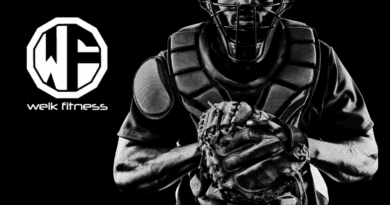Baseball Nutrition Guide: What Should Baseball Players Eat?
You work hard on the field. Yet energy and focus can fade during practice and games. Smart baseball nutrition and steady hydration protect strength, speed, and quick reactions.
I’ve learned a lot during my time playing athletics (especially in college) and gained a lot of wisdom from our team sports dietitian. When I got into sports nutrition, I knew there was a gap that almost all young athletes were missing — good nutrition.
As a certified strength coach and sports nutritionist (BS, CSCS, CPT, CSN), I’ve been able to work with your baseball athletes of all ages and calibers. Young baseball player’s nutrition is all over the board. While they may eat baked salmon with quinoa for one meal, their very next meal may be a value meal from McDonald’s.
From working with high school baseball players to the minor leagues and even MLB players, I wanted to help players understand how important fueling and hydrating truly are. Many athletes fail to see the big picture that what they put in their bodies can determine the outcome of their training and games.
Also, not all supplements are created equal and are beneficial. I spent nearly a decade working for a supplement company, and as someone who is in the weeds with supplements that are NSF Certified, I know what athletes should and shouldn’t focus on.
This guide gives a clear baseball nutrition plan. You will learn what to eat before a game, how to stay fueled during play, and how to recover fast after the final out.
Disclaimer: This article is for informational purposes only and is not meant to treat or diagnose any condition. It is recommended that you speak with your doctor before starting any exercise program, changing your daily nutrition, or adding any supplements to your regimen.
Table of contents
- Essential Nutrients for Baseball Players
- How Much Should Baseball Players Eat Daily?
- What to Eat Before a Baseball Game to Fuel Your Body and Athletic Performance?
- How to Stay Fueled During Games?
- How to Recover Nutritionally After a Game?
- Additional Baseball Nutrition Tips (Performance Nutrition)
- The Importance of Nutrition for Baseball Players (Even Youth Baseball) is Crucial
- Baseball Nutrition FAQs
Key Takeaways
- Build meals around about 50 percent healthy carbohydrates, plus lean protein and healthy fat. A 150 lb athlete often needs 205 to 340 grams of carbs, 82 to 116 grams of protein, and about 68 grams of fat each day.
- Hydration matters. Drink at least 24 oz of water three hours before games. After play, replace each pound lost with 20 to 24 oz of fluid.
- Eat pre-game meals three hours before first pitch. Focus on easy carbs, like pasta or bananas, plus lean protein to help prevent fatigue.
- Refuel within thirty minutes after games. Combine carbohydrates and protein to restore glycogen and repair muscle tissue.
- Avoid fried foods, heavy dairy, spicy meals, large red meat portions, and sugary drinks right before competition. These can cause stomach trouble or energy crashes.
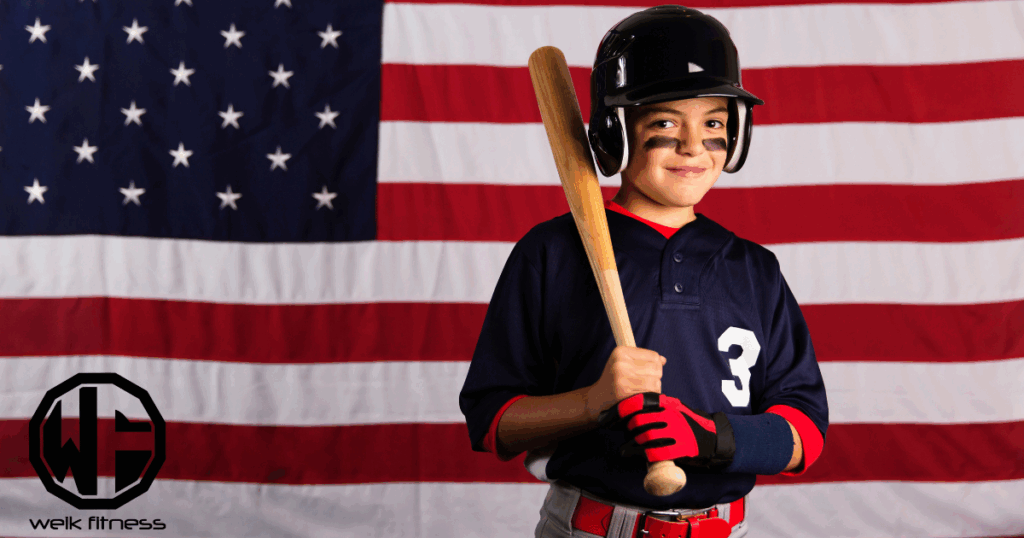
Essential Nutrients for Baseball Players
Your body runs best with the right mix of nutrients. Carbohydrate gives fast energy. Protein helps muscle recovery. Healthy fat supports steady fuel. Vitamins and minerals help bones, muscles, and focus and concentration.
Understanding each piece helps you build balanced meals and snacks for peak sports performance.
Why Are Carbohydrates Important for Baseball Energy?
Carbohydrates are the main fuel for high-effort plays.
Sprints, throws, and swings use stored energy called glycogen in your muscles. Strive for about half of your plate from healthy carbs like whole grain bread, potatoes, rice, and fresh fruit.
A 150 lb baseball player often needs 205 to 340 grams per day to train and compete well.
RELATED: Best Baseball Workouts — Strength Training & Exercises
Choose easy carbs before games to keep blood sugar steady. This helps prevent early fatigue.
Many college players miss their carb needs, and then their energy dips fast in training.
After activity, pair carbs with protein to refill glycogen and rebuild muscle. Simple options like fruit cups or a low fat sports drink can help you stay ready for the next pitch.
How Does Protein Help Muscle Recovery?
Hard play creates tiny muscle tears. Protein repairs those fibers, then builds them back stronger.
For most athletes, target 1.2 to 2.2 grams of protein per kilogram of body weight each day. That supports performance nutrition and injury prevention.
Good sources include chicken, eggs, fish, Greek yogurt, chocolate milk, or protein shakes.
Spread protein across four or five meals or snacks. This steady flow supports muscle mass after resistance training and long games.
Low protein intake can weaken skeletal muscles and raise injury risk over time. If using powders or bars, choose NSF Certified for Sport supplements for safety.
What Are the Benefits of Healthy Fats for Energy?
Healthy fat gives long-lasting fuel and helps with focus. A simple target is about 1 gram of fat per kilogram of body weight each day. That is near 68 grams for a 150 lb athlete.
Sources like avocado, olive oil, nuts, and seeds support heart health and may ease exercise-related inflammation.

Right-sized fat intake can improve body composition. Many players see less extra body fat and better lean muscle. That matters for speed, strength, and coordination on the field.
As a youth coach myself, I always recommend my athletes consume real-food fats like avocado or almonds to keep energy steady all game.
Which Vitamins and Minerals Boost Baseball Performance?
Vitamins and minerals help you perform and stay healthy. Vitamin D supports bone strength and muscle function. Vitamin C supports immune health and recovery. B vitamins help your body turn food into energy.
Iron carries oxygen in your blood, so you do not tire as fast. Calcium builds strong bones for powerful swings and safer slides. Magnesium helps muscles contract smoothly. Choline supports concentration while tracking pitches. Potassium helps prevent cramping and also supports fluid balance with sodium.
A fresh fruit cup with a banana or orange can be a smart pre-practice choice.
How to Maintain Hydration and Electrolyte Balance?
Even a 1 to 2 percent sweat loss can hurt speed and power. Dehydration can result in poor focus and heat exhaustion.
Drink 24 ounces of water about three hours before a game, 16 ounces two hours before, and at least 8 ounces one hour before warm up.
During play, sip cool water or certified sports drinks to support hydration and electrolyte balance. You can even utilize products like DripDrop or Liquid IV to improve hydration levels.
Watch for warning signs such as dry mouth, dark urine, or unusual fatigue.
For longer sessions, add simple snacks like bananas or pretzels to replace sodium and potassium lost in sweat.
RELATED: What Makes the Best Electrolyte Supplements for Athletes?
After games, refuel with carbs and protein to jump-start muscle repair. On the road, pack quick options, including sports drinks that are NSF Certified for Sport, so staying hydrated is easier.
How Much Should Baseball Players Eat Daily?
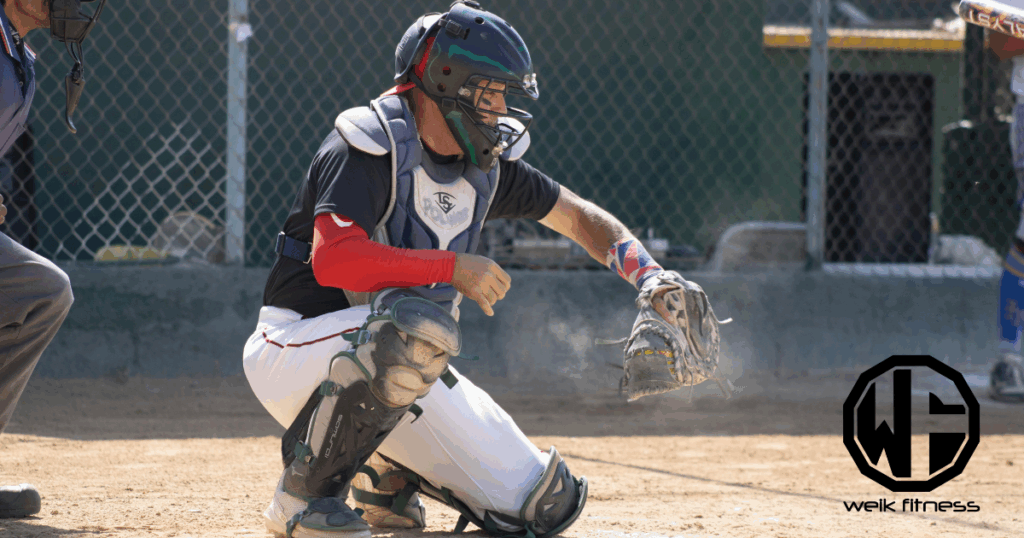
Your body needs enough fuel to handle practices and games. A sports nutritionist or a registered dietitian can help set targets for athletes according to their individual needs.
Some teams use tools like the bod pod or equations like the Siri equation to guide weight goals and protein needs. Fueling right protects lean muscle while supporting training load.
What Are the Recommended Ratios of Carbs, Protein, and Fats for Baseball Nutrition?
Dialing in macronutrients helps performance and recovery. Use these ranges to plan meals and snacks that keep energy steady.
| Nutrient | Recommended Amount (per kg body weight) | Daily Intake Example (150 lb. athlete) | Role in Performance | Key Foods |
| Carbohydrates | 6.7 g/kg | 205–340 g | – Fuels muscle glycogen – Supports energy for long games and practices – Prevents early fatigue | Pasta, Rice, Oatmeal, Whole-wheat bread, Bananas |
| Protein | 1.8–2.2 g/kg | 82–116 g | – Repairs muscle – Aids recovery after workouts – Supports lean mass | Chicken breast, Eggs, Greek yogurt, Lean beef, Tuna |
| Fats | About 25% of total calories | 68 g | – Provides lasting energy – Helps absorb nutrients – Supports joint health | Olive oil, Avocado, Almonds, Peanut butter, Salmon |
- Target about 60 g carbohydrate, 25 g protein, and 20 g fat per meal to support energy and recovery.
- For snacks, aim for about 25 g carbohydrate, 10 g protein, and 5 g fat. This keeps energy steady between innings.
- Many players under-eat carbs. Try to reach at least 291 to 311 g daily. Heavy training may require 340 to 444 g.
These ratios can improve stamina, focus, and recovery. Adjust within the ranges to match your schedule and training goals.
How Do You Calculate Baseball Nutrition Needs by Body Weight?
Start with your current body weight and your activity level. For protein, multiply body weight in kilograms by 1.8 to 2.2. An 80 kg athlete needs about 144 to 176 grams daily. Spread that across meals and snacks for best use.
Set total calories to match your training load. Many active players fall near 3558 kcal per day, but needs vary.
Build plates with complex carbohydrates like oatmeal and potatoes, lean meats or soybeans for essential amino acids, healthy fat from nuts or avocado, and plenty of vegetables for micronutrients and antioxidants.
Track intake and energy levels to fine-tune your plan.
What to Eat Before a Baseball Game to Fuel Your Body and Athletic Performance?
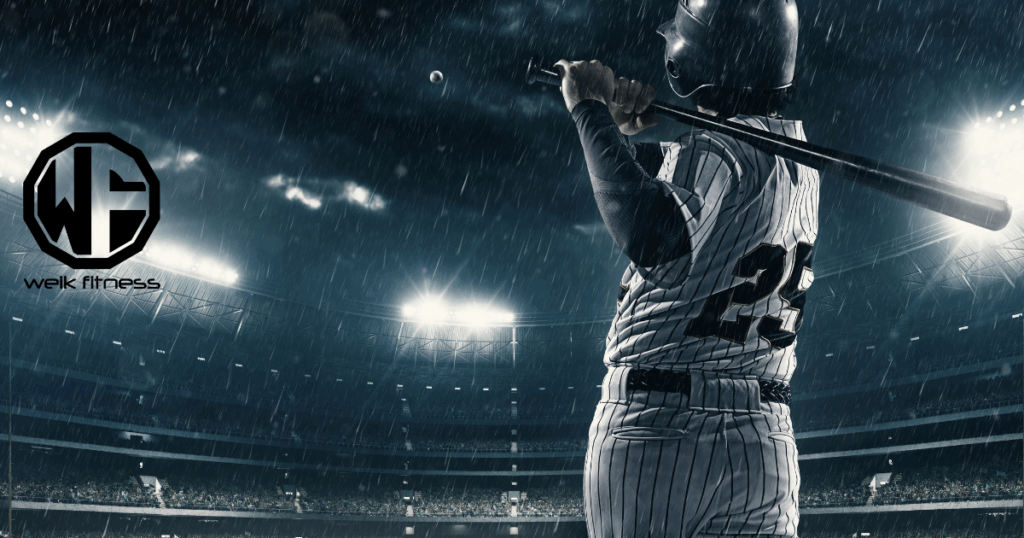
Pre-game choices shape energy, focus, and confidence. Pick foods that sit well and supply steady fuel. Think simple carbs, modest protein, and easy-to-digest produce.
Which Foods Are Best Before a Game?
Pre-game meals should give fuel without stomach stress. Use these steps to build your plate and pre-game snacks.
- Eat a meal three hours before game time. Aim for half carbohydrates, a quarter lean protein, and a quarter fruits or vegetables.
- Use easy carbs like bananas, low fat granola bars, or whole grain bread. These have a lower glycemic index, which helps keep glucose stable as you warm up.
- Add lean protein such as chicken, turkey, or egg whites. Skip fried or fatty meats that slow digestion.
- Choose fresh fruit with natural fructose, like apple slices or berries, for quick energy without a sugar crash.
- Hydrate in stages. Drink 24 oz three hours before, 16 oz two hours before, and 8 oz one hour before first pitch.
- Need more calories or trying to gain weight? Add a small handful of nuts for healthy fat and vitamin E.
- Avoid heavy saturated fat before play. Greasy foods can raise stress on the gut and slow nutrient absorption.
This meal plan based approach fits busy travel and early starts. A little planning keeps fueling simple and reliable.
When Should You Eat Before Playing?
Eat a balanced meal three to four hours before you play. Choose starch-rich foods like rice, pasta, or potatoes, plus chicken or beans for muscle support. A solid dinner the night before also helps, since it tops off glycogen for game day.
RELATED: Baseball Hitting Drills to Improve Your Play
Hydrate in small amounts as the start time gets close. Take 24 ounces three hours out, 16 ounces two hours out, and 8 ounces one hour before. This protects energy levels and supports a healthy gut.
How to Stay Fueled During Games?
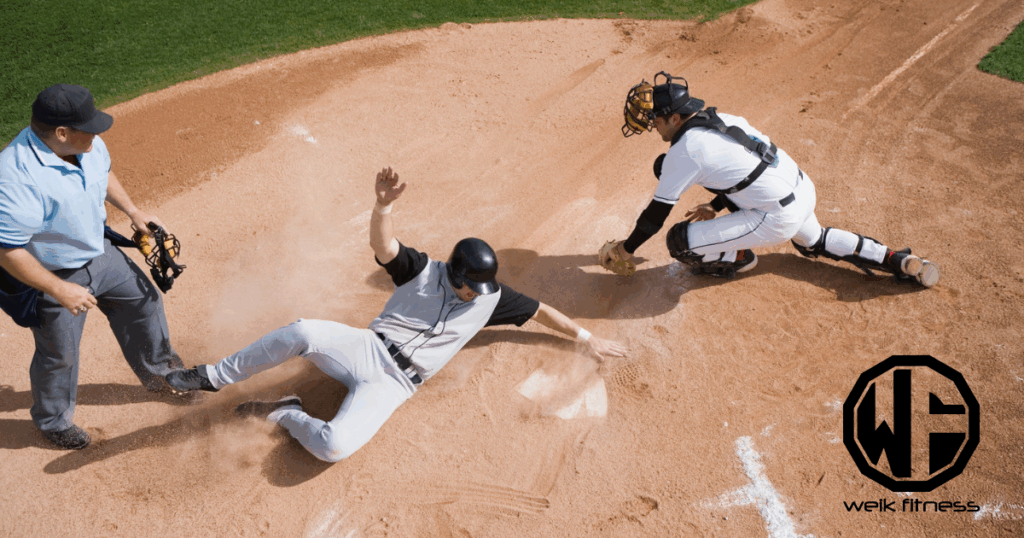
Game pace can drain energy fast. Small, easy snacks and smart sipping keep you sharp, reduce cramps, and support reaction time in late innings.
What Are Good Quick Energy Snacks for Games?
Pick snacks that digest quickly and feel light. They should boost blood sugar without upsetting your stomach.
- Bananas provide quick carbs and potassium to fight cramps.
- Oranges offer vitamin C, water, and natural sugars for a fresh boost.
- Granola bars balance carbs with some healthy fat. Choose options with less added sugar and more plant-based foods.
- Crackers supply simple carbs that are easy on the stomach.
- Peanut butter and jelly sandwiches give carbs, protein, and healthy fat for longer energy.
- Jerky, such as turkey or beef, delivers portable protein without much fat.
- Sports drinks add quick carbs and electrolytes. Sip during hot or humid games.
- Trail mix with nuts, dried fruit, and seeds offers steady fuel across several innings.
These options help stabilize blood sugar during double-headers or playoffs. Keep a few choices in your bag, then rotate as needed.
How Should Players Hydrate While Playing?
Even small fluid losses can lower bat speed and power. Keep a bottle close and sip between innings. Water works for most days. On hot days, use an electrolyte sports drink to replace sodium, potassium, and chloride lost in sweat.
Follow a simple plan. Drink 17 to 20 ounces two hours before first pitch. Add 7 to 10 ounces right before warm up. During play, drink on every break. Coaches can remind athletes to drink on schedule, especially during heat. Good hydration supports fat free mass, focus, and steady effort.
How to Recover Nutritionally After a Game?
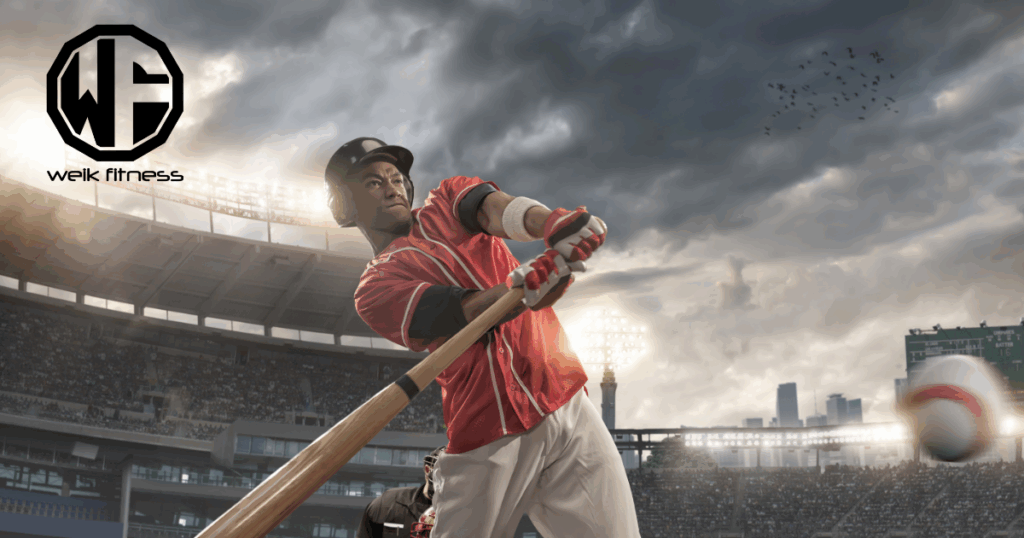
Recovery nutrition sets up tomorrow’s practice. Your body needs carbohydrates, protein, and fluids to repair muscle, restore energy, and control soreness.
Why Refuel with Carbohydrates and Protein for Baseball Nutrition?
Games and workouts drain glycogen, your stored carbohydrate. Replacing it soon after play helps you feel ready for the next session. Skipping carbs slows recovery.
Protein is also vital. It repairs stressed muscles and helps build new fibers. Studies on college athletes show that low carb and low protein intake can delay recovery and reduce performance.
Try chocolate milk or Greek yogurt with berries. Each gives fast carbs plus protein to support muscle recovery and health.
What Are Effective Rehydration Strategies for Baseball Nutrition?
Rehydration after play helps your heart and muscles recover. Use this checklist to refill fluids and electrolytes.
- Before competition, drink 24 oz three hours out, 16 oz two hours out, and 8 oz one hour out to start hydrated.
- During games, sip water or electrolyte sports drinks to replace fluid and minerals lost in sweat.
- Weigh in before and after. Drink 20 to 24 oz for every pound lost.
- Choose drinks with sodium, potassium, and chloride to support nerve signals and prevent cramps.
- Pick options that are NSF certified for sport to reduce risk from contamination.
- Use low glycemic snacks like bananas or oranges during breaks to support energy and hydration without spikes.
- Limit high caffeine drinks right after games. They can increase urine output and slow rehydration.
- Within 30 minutes post-game, pair carbohydrates with protein. This restores glycogen and supports muscle repair.
- Check urine color. Pale yellow suggests good hydration. Darker shades mean you need more fluid.
These habits help you bounce back faster and get ready for the next practice.
Additional Baseball Nutrition Tips (Performance Nutrition)

Smart choices help you meet the demands of the sport.
Strive for good hydration, steady energy, and foods that support vision and muscle function. Check that any supplement is NSF certified for sport, since safety matters for health and performance.
Which Foods Should Be Avoided Before Games?
Some foods can slow you down or upset your stomach on game day. Keep your pre-game menu clean and simple.
- Skip processed items like fast food or fried chicken. These can cause energy crashes.
- Avoid heavy, greasy meals such as pizza, burgers, or nachos before playing.
- Limit sugary treats and drinks, like candy bars or soda, that spike blood sugar, then crash it.
- Avoid very high fiber foods right before a game, such as beans or lots of raw onions, which can cause gas.
- Do not eat large portions of red meat right before warm ups. They digest slowly.
- Skip spicy foods like hot wings if they cause heartburn.
- Watch dairy-heavy items, like milkshakes, if they upset your stomach.
- Pass on chips and other empty-calorie snacks that fill you up without fuel.
- Choose water or an electrolyte sports drink instead of sugary soda to support hydration.
These tips help keep energy steady from first pitch to the last out.
What Role Do Supplements Play in Baseball Nutrition?
Supplements can help close small gaps in a balanced diet. Common choices include protein powder, creatine, or a basic multivitamin. These may support muscle repair and recovery during busy weeks.
Always choose products that are NSF Certified for Sport. That label helps reduce the risk of banned substances.
Game travel can disrupt meals. In those cases, a sports drink with electrolytes may help if hydration falls behind. Track how you feel and perform, then keep what works and drop what does not.
Real food comes first. Supplements support your plan, they do not replace it.
The Importance of Nutrition for Baseball Players (Even Youth Baseball) is Crucial
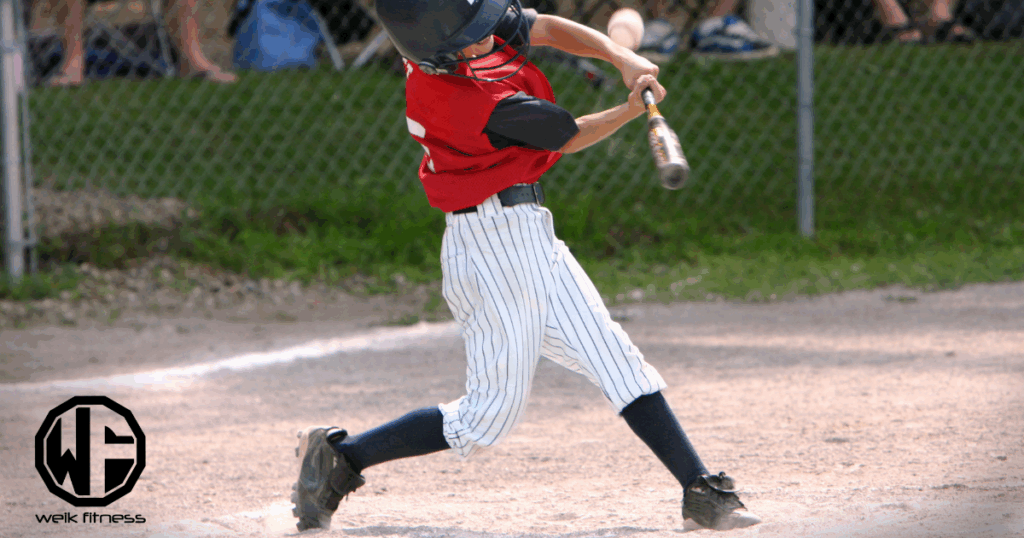
Fuel your body with a clear, simple plan. Focus on steady carbohydrate for fuel, lean protein to rebuild muscle, healthy fat for lasting power, and vitamins and minerals for strong bones and focus. Use a sports drink wisely and hydrate early, not just when thirsty.
RELATED: Wilson A2000 — The Best Infield Wilson Baseball Glove?
Check your intake against your estimated average requirement. Some teams use tools like factorial ANOVA or other testing to review trends. What matters most is how you feel, practice, and play.
For personal guidance, work with a registered dietitian or a sports nutritionist. If I can help in any way, please let me know. Clearly, I write and publish a ton of content, but holding several certifications, I also do in-person sport-specific training as well as baseball nutrition guidance for athletes.
Build these habits, then step onto the diamond with confidence. Your energy, focus, and recovery will support your best baseball all season long.
Baseball Nutrition FAQs
Nutrition plays a key role in supporting energy, muscle recovery, and mental focus during games. Eating the right foods helps athletes meet their estimated average requirement for nutrients, which supports both short-term performance and long-term health.
A balanced plate might include grilled chicken breast, brown rice, steamed broccoli, and a side of fruit. This meal provides protein for muscle repair, complex carbs for lasting energy, vitamins to boost immunity, and fiber to aid digestion.
Standard deviation measures how much nutrient intake varies among players; understanding this helps coaches tailor plans more precisely. A low p-value from factorial ANOVA tests can show if changes in diet make real differences in athletic outcomes.
Sticking with science-backed guidelines lets you target clear objectives (like building strength or improving stamina) with confidence to ensure your plan works. Consistent meals based on estimated average requirements keep your body fueled so you perform at your best every inning… and recover faster after each game!


*Disclosure: This article may contain affiliate links or ads, which means we earn a small commission at no extra cost to you if you make a purchase through these links. These commissions help support the operation and maintenance of our website, allowing us to continue producing free valuable content. Your support is genuinely appreciated, whether you choose to use our links or not. Thank you for being a part of our community and enjoying our content.
PLEASE CONSIDER SHARING THIS ON YOUR SOCIAL MEDIA TO HELP OTHERS LEARN MORE ABOUT THIS TOPIC.


